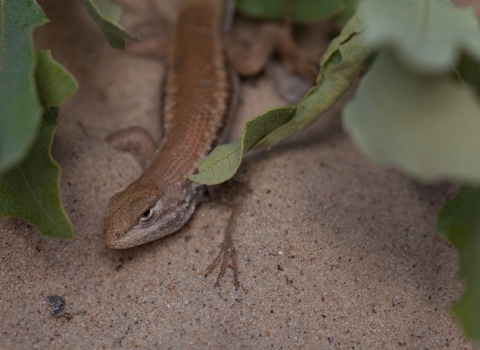The U.S. Fish and Wildlife Service has completed a Final Environmental Assessment and Land Protection Plan for the proposed expansion of Bond Swamp National Wildlife Refuge in central Georgia. The project lands cover about 12,000 acres of bottomland hardwoods, forested wetlands, and other riverine habitats along the Ocmulgee River. They are located adjacent to the refuge's current northern, southern, and western boundaries in Bibb, Houston, and Twiggs Counties, Georgia, about 7 miles south of the city of Macon.
Sam D. Hamilton, the Service's Southeast Regional Director, said the project lands are proposed for protection and management as part of the refuge through a combination of fee title purchases from willing sellers and conservation easements or cooperative agreements with willing landowners.
"The acquisition of these lands will be a positive step in protecting and managing a tremendous diversity of additional fish and wildlife habitats as part of Bond Swamp National Wildlife Refuge," said Hamilton.
"We are pleased that this project is being made possible through the cooperation and support of the Advisory Committee for the Ocmulgee Heritage Greenway," continued Hamilton, who approved the land protection plan in February.
The proposed refuge expansion is a key component of the Ocmulgee Heritage Greenway Project, which seeks to protect over 45 miles of the Ocmulgee River floodplain from Juliette in Monroe County to Warner Robins Air Force Base in Houston County. The proposed Greenway will create an integrated system of scenic, historic, and recreational resources along the Ocmulgee River for the enjoyment of the public. The Greenway Advisory Council has recommended that the proposed refuge expansion lands be acquired to form the conservation areas for the Greenway.
Acquisition of the project lands will bring under Service protection additional bottomland hardwood and riverine habitats for the benefit of a wide variety of fish and wildlife, including migratory birds such as the bald eagle and Swainson's warbler, wading birds, wintering waterfowl, white-tailed deer, black bear, and many other species of game and nongame wildlife. The river's fishery, which includes striped bass, largemouth bass, and the endangered shortnose sturgeon, will also receive greater protection under the proposed refuge expansion.
In addition, the refuge expansion will provide opportunities for a variety of compatible public uses in association with the Ocmulgee Heritage Greenway. Some compatible outdoor recreational activities that will be offered, once the project lands are acquired, include hunting, fishing, hiking, boating, wildlife observation and photography, and environmental education and interpretation.
The partners involved in the Greenway project include the U.S. Fish and Wildlife Service, the Trust for Public Land, the Georgia Department of Natural Resources, the City of Macon, the Macon Water Authority, the Bibb County Board of Commissioners, and the National Park Service.
"This project shows what is possible when a community brings together a variety of federal, state, and local government agencies and private organizations to work for the common good," said Hamilton.
Copies of the final environmental assessment and land protection plan for the refuge expansion are now available and can be obtained by contacting the U.S. Fish and Wildlife Service, Planning and Support Team, 1875 Century Boulevard, Suite 420, Atlanta, Georgia 30345, telephone 1-800-419-9582.
The U.S. Fish and Wildlife Service is the principal federal agency responsible for conserving, protecting, and enhancing fish and wildlife and their habitats for the continuing benefit of the American people. The Service manages the 93-million-acre National Wildlife Refuge System comprised of more than 500 national wildlife refuges, thousands of small wetlands, and other special management areas. It also operates 66 national fish hatcheries and 78 Ecological Services field stations. The agency enforces Federal wildlife laws, administers the Endangered Species Act, manages migratory bird populations, restores nationally significant fisheries, conserves and restores wildlife habitat such as wetlands, and helps foreign governments with their conservation efforts. It also oversees the Federal Aid program that distributes hundreds of millions of dollars in excise taxes on fishing and hunting equipment to state fish and wildlife agencies.
X X X
Release #: R99-027


